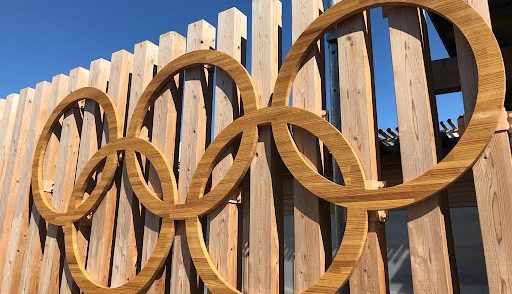The Tokyo 2020 Olympics: Was it worth it?
December 1, 2021
Remembering the 2020 Olympics: the startline to a new society
British diver Tom Daley knitting a pouch on the bench was not something we expected to see during the Olympics. Nor did we expect a new sport, skateboarding, to rise in popularity with the podium conquered by young female athletes. Most importantly, we didn’t expect to see athletes from more than 200 countries compete in the middle of a pandemic. When the International Olympic Committee (IOC) announced that the Tokyo 2020 Olympics would be taking place this year, it sparked a heated debate. Nonetheless, the 2020 Olympics were held during the pandemic following strict COVID-19 guidelines. They also came with outstanding records of being the first gender-balanced Olympics and the largest number of LGBTQ+ athletes in history. The 2020 Olympics brought a beam of hope during these dark times through the joyous games broadcasted throughout Japan.
In the midst of bleak ambiguous times, the 2020 Olympics filled the viewers’ summers with exhilarating moments that left audiences on the edge of our couches at all times. The efforts and joys of athletes could be felt through the TV screen, but the empty bleachers made the stadiums look lonelier than they would have with live audiences. Of course, if it weren’t for the efforts and strict regulations made by the Olympics Committee, the event itself would not have been held. Behind the scenes of the empty bleachers, there were many impressive COVID-19 precautions that were followed in order to keep both the athletes and the people of the host country safe.
The Bureau of Olympic and Paralympic Games Tokyo 2020 Preparation developed guidelines from general associates for athletes and coaches on their website in a clear infographic. In the Tokyo 2020 Playbooks, athletes had fixed transportation and were required to download specific applications that helped them track any risks of COVID-19 transmission during their stay. Not only were spectators not allowed in the stadiums, but many events also took place away from the metropolitan areas of Tokyo.
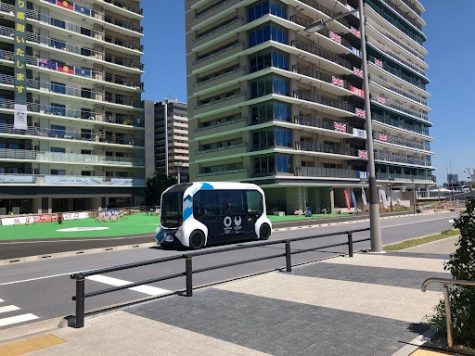
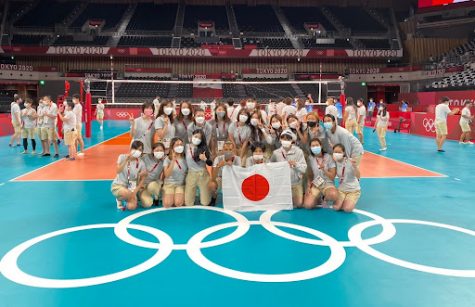
Were all of these precautions actually effective? Although the increase in cases did not stop, the increase was unrelated to the athletes but more related “to the lack of government action and public response,” stated Hana (‘22) in her article: “2020 Games showcased the importance of collective compliance”.
Three alumni from Sacred Heart: Alisa (‘20), Karin (’20), and Erisa (‘20), had the opportunity to intern at the 2020 Olympics. The application process, training, and actual work followed strict COVID-19 precautions as well. Karin (‘20) stated that only surgical masks were permitted and N95 masks were provided specifically for interns to reduce transmission between them and the athletes. Interns were provided early vaccinations, daily PCR tests, and temperature checks. “I felt a lot safer and more protected than my everyday life,” she said, recalling the strong friendships and memories she made during this once-in-a-lifetime event.
As a ‘global event’ has the 2020 Olympics actually accomplished its association with the universality of sports? Despite its globally diverse participants, balance in gender ratio in the Olympics was always an issue. However, the 2020 Olympics was one of the first games where this advancement towards diversity was seen clearly. An article by Vogue Japan published in August reported that 49% of all athletes were female. Although the gender gap in sports still remains, we are taking the first step to breaking the mold, giving young girls the confidence to take steps to pursue sports.
Along with this progression, the highest number of people identifying as part of the LGBTQ+ were recorded in the 2020 Olympics. According to The New York Times, at least 185 Olympians publicly identify as part of the community, which was triple the number of the Rio 2016 Olympics. Daley, who identifies as gay, said in an interview with The New York Times that, “I never thought I would be able to do anything because you don’t see yourself represented in that way.” The 2020 Olympics was the first Olympics that truly opened a path to a more accepting and diverse world. “This could continue to help open doors for others to follow,” said Prasha (‘22) in her article “The International Olympics Committee (IOC) should stand by LGBTQ+athletes.” Alisa (‘20) said via an email, that the 2020 Olympics were a way to “learn to celebrate diversity and to embrace people as people regardless of their nationality or background.”
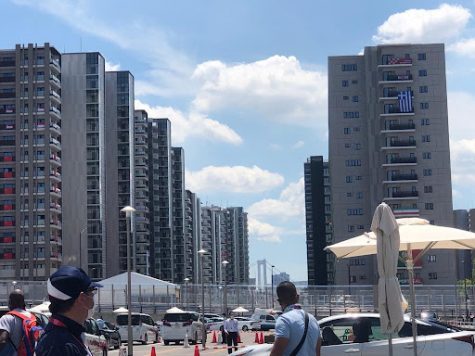
(Photo credit: Khwaish (‘24))
Putting aside all of the controversies and political opinions, did the public enjoy the Olympics? “The Olympics gave us a precious opportunity to celebrate and enjoy, as well as a sense of unity through sports during a time when people literally had to maintain distance,” said Alisa (‘20).
Though many were against the idea of holding the 2020 Olympics due to concerns regarding the current pandemic, changes in opinions were seen once the event officially began. The PR Times surveyed families with younger children in Japan and received 290 responses. 82.1% said they watched the 2020 Olympics as a family; events like soccer and swimming were most commonly watched. 33.1% noticed changes in their children’s behaviors, stating that the 2020 Olympics sparked interest in different sports as well as taught and encouraged children about perseverance and empathy. In a survey answered by Sacred Heart High school students, with a total of 86 responses, 41.2% responded that they believed the 2020 Olympics should not have taken place or should have been postponed. Out of the 41.2%, roughly 30% said their opinions changed after the event actually started. A high school teacher who responded to the survey stated, “until the games began, I had forgotten how valuable the 2020 Olympics can be for providing inspiration at various levels and positivity between the athletes, regardless of the country they were representing.”
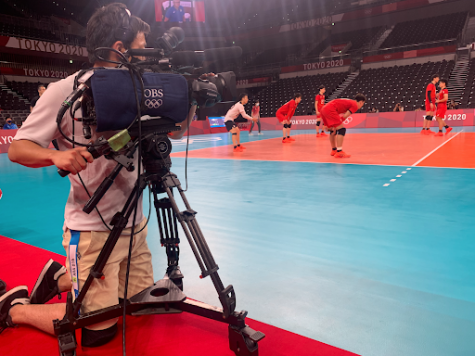
The 2020 Olympics was a step towards the future, giving us many “firsts” and a future with new possibilities, we hadn’t seen before. With careful COVID-19 precautions, the 2020 Olympics was able to be held safely during a global pandemic. The increase in the involvement of the LGBTQ+ community and higher gender balance in the 2020 Olympics also showed that our society is moving in the right direction. The Olympic Charter states that the Olympic games are a way of celebrating the “service of the harmonious development of humankind” and the 2020 Olympics did just that. Joining 8 billion people around the world, the Tokyo 2020 Olympics will be remembered as the time the world united during a universal crisis.
Remembering the 2020 Olympics: an empty promise with a great cost
The 2020 Tokyo Olympics is indisputably one of the most significant events that took place this year— not only nationwide but also on an international scale. However, such an important event was accompanied by big and small controversies. In early February, Yoshiro Mori, the head of the Tokyo Organising Committee of the Olympics and Paralympic Games, received fierce criticism for his sexist statement that women talk too much and that meetings with female directors are time-consuming. Furthermore, there was a strong group of citizens opposing the holding of the games during the pandemic. It was very apparent that holding the Olympics would not be a smooth process from the very start. Despite the difficulties, the Olympic Games were eventually held from June 23 to August 8, 2021. Looking back at the games now, it is true that the games did provide some feeling of solidarity among athletes and the audience. Nevertheless, many still firmly believe that the games should have been canceled—or at least postponed to the next year—since the risks Japan took regarding the economy, social issues, and the global pandemic were too significant to be sugarcoated by such intangible benefits.
To begin with, the Tokyo 2020 Olympics failed to provide Japan with the financial benefits of regular (non-pandemic) Olympics, but instead, put more burden on the Japanese economy. In former Olympic events, profits came from international tourists who visited the country to watch the games. The tourists, who spent weeks in hotels near stadiums, would tour around the city and consume goods. The previous Olympics also advertised to promote the country, attract more people, and develop international trading connections. However, the Olympics that took place this year were completely different. To prevent the spread of COVID-19, Japan banned foreign spectators. The absence of an audience in the games meant that Japan could not earn profit by selling tickets and opening tourist activities. In a report from the Nomura Research Institute, Takahide Kiuchi, an economist at the Nomura Research Institute,states that this would cause economic losses of $1.4 billion. Such profit was crucial to make up for the debt caused in building Olympic stadiums and organizing events, and without them, Japan would inevitably have to face financial problems. What makes the situation worse is the excessive amount of money that was invested in the Olympics. According to the Guardian, the money spent organizing the games was over-budget by 111%, which Japan could have used to build 300 new 300-bed hospitals or 1,200 elementary schools. This also angered citizens since six billion dollars of public tax money was put into the games, but the games were held without an audience.
A mixture of fear and confusion toward the Olympics was seen in the protests that occurred before the Tokyo 2020 Olympics opening ceremony. In an interview with the NHK, a 35-year-old woman who participated in a protest at Harajuku station summarized the feelings of the Japanese people: “I was originally excited for the Olympics but there are things we need to prioritize right now. I believe letting the Olympics take place is questionable, and so I decided to take part in the protest.” These protests didn’t just take place in Japan, but all over the world. Protesters gatecrashed a press conference with the IOC with signs reading “No Olympics anywhere. We don’t want the Olympics. No Olympics in LA. No Olympics in Tokyo.” The unpopularity of the Tokyo 2020 Olympics increased significantly as citizens suffered through the COVID-19 pandemic— a time of uncertainty where people have lost loved ones, faced financial problems and have even become homeless. Even though the games were promoted as a symbol of peace and hope, for people who had gone through hardship during COVID-19, they symbolized another risk, which led to the protests. The fact that the International Olympic Committee and the Japanese government continued with the Olympics even after so many people were strongly against it raised the question: “Who was the Olympics for in the first place?”
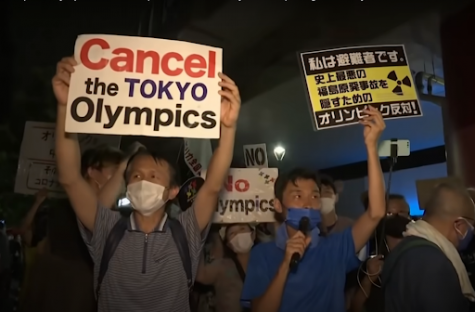
Photo credit: The Guardian, YouTube
Another severe social issue that resulted from the Olympics was the pressure on the homeless population in Tokyo. Homeless people were forced to hide away from sight. The Japanese government came up with regulations so that the parks were closed and lit during the night to discourage the homeless from staying there. The purpose of these regulations was to make Tokyo look like a “cleaner” and “wealthier” city to foreign reporters and athletes. A 62-year-old homeless man who had lived near the Tokyo Metropolitan Government’s Building in Shinjuku Ward said that a government official approached him on July 8, telling him to remove his belongings by July 21 because they were creating obstacles for road management. In the past, the homeless were able to settle down in a particular spot for at least a month or so, but because of the Tokyo Olympics, they were forced to look for places more often. This made the lives of the homeless extremely difficult during the Olympic season.
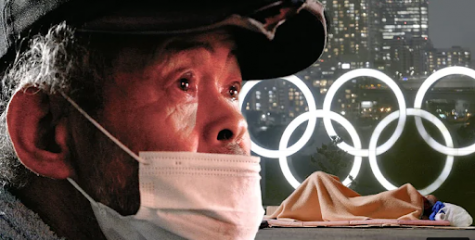
Photo credit: BBC Youtube
The biggest problem in the Tokyo 2020 Olympics was the mismanagement of the pandemic in Japan and in the games, that led to a surge in COVID-19 cases. Just the day before the opening ceremony, Tokyo had over 5,000 new COVID-19 cases. This number steadily increased, reaching record-breaking numbers every day during the games and well after. A two-week event that was held in late July had kept the COVID-19 cases over ten thousand every day until early September. This was extremely unfair for Japanese people since they had to endure over a month of record-breaking COVID-19 cases, for an event they had to experience through the TV. Precautionary measures weren’t sufficient. The games saw over 400 cases with some of the first ones popping up before the opening ceremony. Yet still, the games continued. This was also a risk to athletes in the long term since the long-lasting side effects of COVID-19 could destroy their careers, especially because it largely relies on physical capabilities.
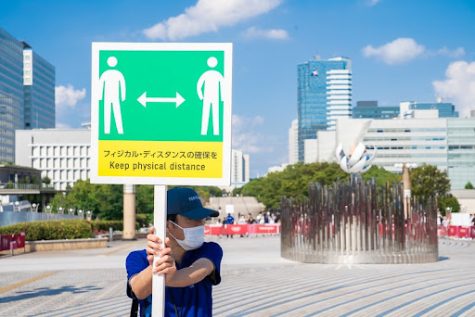
Photo credit: Creative CommonsAngel
Furthermore, even with the precautions taken and the daily testing, the athletes enjoyed more freedom than the people of Japan. During the Olympics, Japan was in the middle of a state of emergency, which meant that all shops had to close by eight, there were limits on gatherings, and people were strongly urged to stay at home. The fact that the Olympics was happening during this time gave people the impression that the state of emergency wasn’t a big deal, since the athletes were allowed to interact with other athletes and socialize. Meanwhile, those who were compliant with government requests for restricted movement, sat in their houses wondering when they could enjoy the same freedom.
Yes, the Olympics were entertaining— only for the ones who did not have to face such problems. The Olympics have left behind so many short-term and long-term issues, regarding financial hardships, the negligence of the homeless community, and the increase of COVID-19 cases indirectly. Stepping back from the actual event and looking at it from a more practical perspective, it is evident that Japan was not ready for the Olympics at all. The Tokyo 2020 Olympics will not be remembered as a hopeful step towards the future but an irresponsible decision that should not be repeated.
